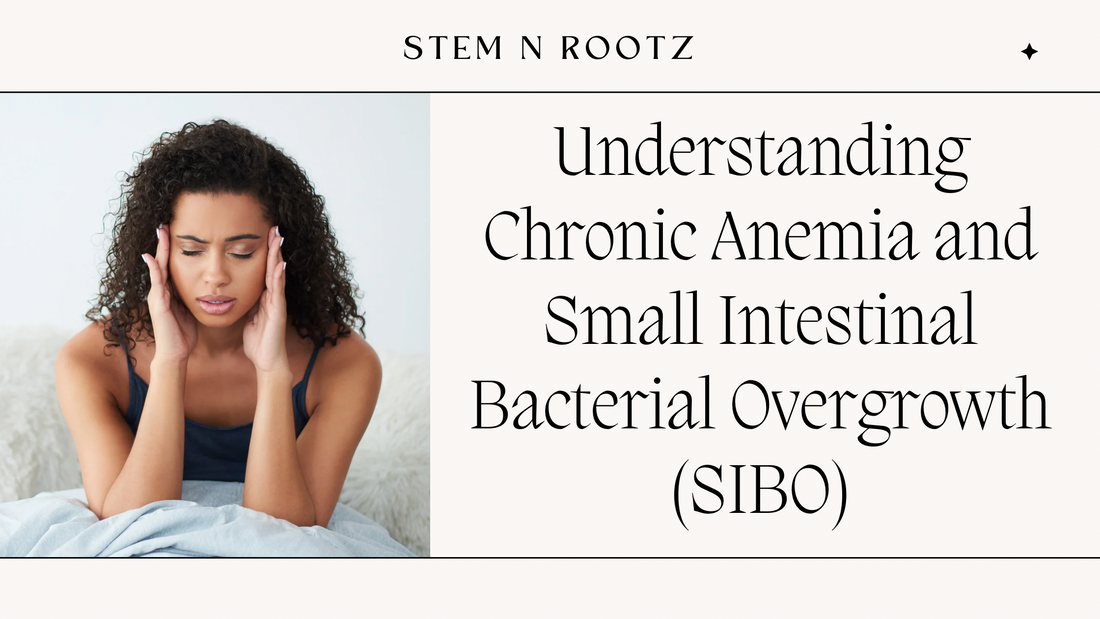
Understanding Chronic Anemia and Small Intestinal Bacterial Overgrowth (SIBO): How to Heal and Restore Gut Health
Chronic anemia is a condition that can often be linked to an underlying issue such as Small Intestinal Bacterial Overgrowth (SIBO). This condition occurs when bacteria that are typically found in other parts of the gut begin to overgrow in the small intestines, leading to malabsorption of nutrients, including iron. Iron is critical for red blood cell production, and without proper absorption, chronic anemia can develop. If left untreated, this can result in symptoms like fatigue, dizziness, and weakness.
How Does SIBO Contribute to Anemia?
When bacterial overgrowth occurs, the bacteria begin consuming vital nutrients, including iron, before your body can absorb them. This results in nutrient deficiencies, which are especially noticeable when it comes to iron. Additionally, the overgrowth can lead to chronic inflammation in the intestines, further inhibiting nutrient absorption.
Addressing the root cause SIBO can significantly improve your anemia and overall gut health. Here’s how you can attack the bacteria and aid in the healing of the small intestines.
Steps to Combat Bacterial Overgrowth and Heal the Gut
1. Targeting Bacterial Overgrowth
- Herbal Antimicrobials: Natural remedies like oregano oil, berberine, thyme, and pau d'arco can be effective in reducing bacterial overgrowth. These herbs have natural antimicrobial properties that help reduce harmful bacteria without disrupting the entire gut microbiome.
- Probiotics: Restoring the balance of healthy gut bacteria is key in combating SIBO. Probiotic strains like Lactobacillus and Bifidobacterium can crowd out harmful bacteria and restore balance. Including fermented foods like sauerkraut, kimchi, and kefir can also support a healthier gut environment.
- Antibiotics (as needed): In more severe cases, a healthcare provider may prescribe antibiotics like rifaximin. These target bacteria in the small intestine, reducing the overgrowth and allowing your body to begin proper nutrient absorption again.
2. Healing and Supporting the Small Intestines
- Digestive Enzymes: To enhance digestion and nutrient absorption, consider adding digestive enzymes. These enzymes help break down food more efficiently, reducing the strain on the intestines and ensuring that nutrients like iron are properly absorbed.
- Bone Broth and Collagen: These are rich in amino acids, especially glycine, which can aid in repairing the intestinal lining and reducing inflammation. Regular consumption can help strengthen the gut barrier, promoting better nutrient absorption.
- Soothing Herbs: Herbs such as slippery elm and marshmallow root create a soothing coating in the digestive tract, protecting the gut lining and allowing it to heal. These herbs can reduce inflammation and help with gut permeability issues commonly associated with SIBO.
3. Addressing Nutrient Deficiencies
- Iron-Rich Foods and Supplements: Incorporating iron-rich foods like leafy greens, beets, lentils, and quinoa into your diet can help replenish iron stores. Pairing these foods with vitamin C-rich options like citrus fruits helps enhance iron absorption.
- Iron Supplements: If your anemia is severe, your healthcare provider may recommend iron supplements. However, it's important to take these in a way that doesn’t feed the bacteria, so always consult with a professional about timing and dosage.
4. Dietary Adjustments to Support Gut Health
- Low FODMAP Diet: This temporary dietary approach reduces fermentable carbohydrates that feed harmful bacteria in the small intestines. By reducing these foods, you essentially starve the overgrowth, giving your gut a chance to heal.
- Avoid Refined Sugars and Processed Foods: These foods can exacerbate bacterial overgrowth and create more inflammation in the gut. Instead, focus on whole, nutrient-dense foods that promote healing and gut balance.
Healing Takes Time, But It’s Worth It
Addressing chronic anemia and bacterial overgrowth requires a multifaceted approach. By targeting the bacterial overgrowth, supporting the healing of the small intestines, and addressing nutrient deficiencies, you can restore balance and improve both your gut health and anemia symptoms. Healing the gut takes time, but with consistent care and the right herbal and dietary support, you’ll be on the path to better health.
